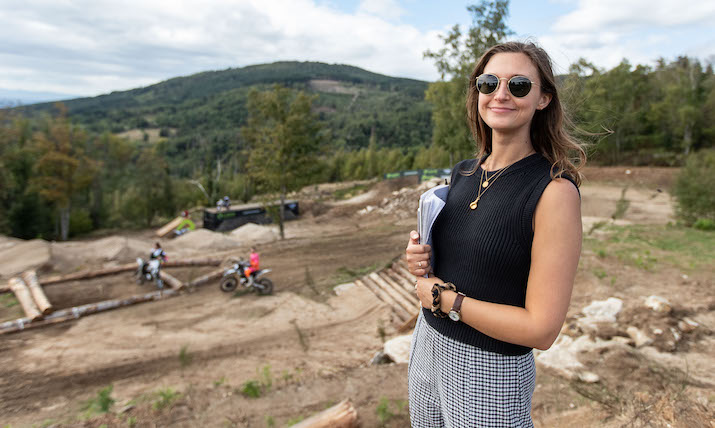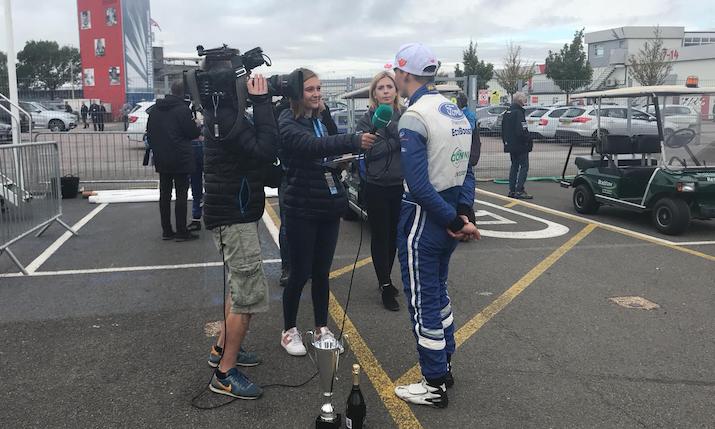Stepping Stones: Taz Addison on how her passion for motorsport led her to a career in broadcast

Producing onsite at a test event for E-Xplorer
In the latest article in our Stepping Stones series, Taz Addison, assistant producer at Aurora, highlights the importance of embracing variety and taking every opportunity to find your perfect role in the industry.
What is your job role today and what do you love about it?
I’m an assistant producer, working predominately across Formula E. I produce the preview show for every event and onsite I act as lead VT producer. I also work on Extreme E as a VT coordinator.
I love the excitement of live sport, getting invested in the backstories of the athletes and the highs and lows they go through, watching their narratives develop. The buzz of a live show, it’s high intensity and high adrenaline; it doesn’t matter how many times you go live the excitement is always the same.
I also love the variety. Every show is different and my role can change depending on what I’m working on. This means I have the opportunity to learn from some of the best in the business, with the support to try new roles so I can continue to develop.
Producing the preview show and highlights programmes allows me to watch my work come to life, hearing scripts I’ve written be voiced as well as getting to work with incredible editors who make it all happen.
What does your current job entail on a day-to-day basis?
We produce 11 preview shows across the season, including a two-part pre-season show and a season review. On top of this there are highlights for each round, all of which need to be scripted. This requires us to gather as much information as we can around each event, to put together an engaging script that flows from part to part and that works best with our footage.
I’m often in the edit, working with the editor to piece the show together and supply it on deadline.
Preparing for the next event is also a big part of my role. I work with the senior and executive producer to create a make list that details what VTs need to be created, who will make them, when the footage will be supplied and what shows they will be needed for. This sets the groundwork for the event ahead and keeps me organised.
Can you talk us through your relevant education that helped you break into the sports broadcasting industry?
I had a place at King’s College to do Philosophy, Religion and Ethics but didn’t feel it was right for me at the time, so I decided to take a year out and pursue other options. I was very lucky to have a contact in the industry already, through which I managed to get an interview to work as a runner at The London Studios. I got the job and from that point on I never looked back.
I worked in entertainment initially, across shows like Have I Got News for You and Mock the Week, before working as the production assistant on The Graham Norton Show for two years. As much as I loved working on these types of shows I always knew I wanted to work in sport, motorsport specifically, as racing had been a part of my upbringing.
How did you get your first job in sports broadcasting, what was the role, and when?
My first job in sports broadcasting was as a runner for ITV Sport, in the office and onsite working on the British Touring Car Championship. ITV owned The London Studios, so while the TV studios were on the lower floors, their offices made up the rest of the building. In my 11 months working as a studio runner, I made a contact at ITV Sport who knew I had an interest in motorsport and it was through them that I got my first job in sports broadcasting.
It was a job I enjoyed hugely, working closely with the producers to get the shots needed in the live show, running up and down the pitlane with the camera operator and being right in amongst it, rain or shine. I knew at this point that this was what I wanted to do with my career.
Following that, I worked across football, rugby, snooker and horse racing with ITV Sport, working my way up as I was given more responsibility and new opportunities. One day I could be interviewing drivers, the next I could be producing highlights edits for the live show. It was a massive learning curve and every job was different.

Conducting post-race interviews at the British Touring Car Championship
What happened next to get you where you are today?
I continued freelancing, making contacts at several different companies, the last being the AELTC as a broadcast assistant for the Wimbledon Tennis Championships. This led me into the world of tennis as I got my next role at WTA Media, where I gained my first experience in editing, making newsreel highlights for tournaments around the world.
I applied for the job knowing I had a lot to learn but having spent the last few years jumping in at the deep end, I had the confidence to go for it.
I got my first taste of night shifts in this role, as the tournaments were happening over a variety of time zones, the first being in Australia. This has stood me in good stead ever since, as every job I’ve had since has had an element of unsociable hours which I now know how to manage well.
Editing experience and a move up to the job title of junior assistant producer helped me then land the role of assistant producer at Eurosport, working on the British and World Superbikes. Coming from a motorsport background it combined a passion of mine with a job I loved doing.
It was here I worked as a VT co-ord for the first time, which was a huge adrenaline hit as we could be live for up to eight hours. This was a role I had not considered before, but once I did it I was hooked and always felt a huge sense of achievement after each show.
I went freelance the following year, working with a variety of companies as a VT co-ord and AP, but it was working with Aurora on Formula E that got me to where I am today, working full time with them as an assistant producer.
Where job would you like to have in in five or 10 years’ time? What are your career goals?
I’ve always had the mentality that there is so much to learn and so many paths to take in this industry, so rather than have a specific plan, I instead take the opportunities that are presented to me and try everything I possibly can. Through this I’ve learnt that I love the buzz of live TV and this year I’ve been given the chance to try my hand at live producing which I’m really excited about, so I’d love to continue in this vein.
Can you give us some top tips that really helped you get where you are today?
The best advice I’ve been given is to learn as much as you can in the role that you’re in before you move up. The same title can have many different meanings across companies, so knowing everything the role can encompass gives you a wider understanding of what to expect as you progress in your career.
“Making contacts is one of the most important things you can do. TV is a small world and people always come back around when you least expect it”
Making contacts is one of the most important things you can do. TV is a small world and people always come back around when you least expect it. Almost every role I’ve had has come through a contact I’ve made along the way, so I would say this is crucial to moving forward in the industry.
Can you give us some tips on things not to do or to avoid when trying to get a role you really want?
I think the thing to avoid would be to limit yourself. Go for every opportunity and take every chance you get to learn something new, even if it feels out of your comfort zone. You never know what it might lead to. Also, remember that first impressions can really count – so many jobs come through referral so the better impression you make the more likely people are to mention your name when an opportunity arises in the future.
Don’t be put off if you don’t get the job you want, however. Things can change so easily and again there are so many paths to take that may lead to exactly where you want to go, but in a way you weren’t expecting.
What would you recommend to other people thinking of working in the broadcast industry?
There is so much to choose from and so many paths to take in this industry, the role you may end up loving more than anything else might not even be on your radar when you start, so always have an open mind and follow the opportunities where you can.
This industry can be weekend heavy so be prepared to work all sorts of hours. The pay off, though, is working on something you love and getting that sense of achievement at the end of the day.

